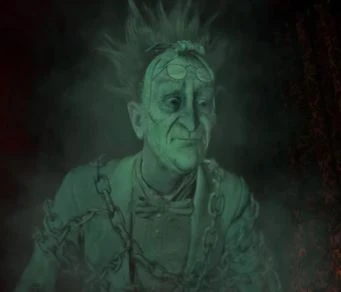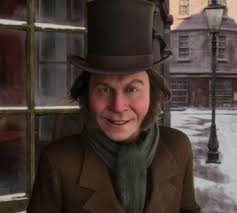1. “Chains forged in life bind tighter in death.”
2. “Regret is the heaviest burden a soul can bear.”
3. “I wore the chains I forged in life.”
4. “There is no bargain in the afterlife, only the debt of deeds unpaid.”
5. “In life, I treaded the path of greed; in death, it haunts me.”
6. “Earthly riches fade, but guilt endures.”
7. “Learn from my torment, and change your fate.”
8. “The clinking of my chains is the echo of my life’s mistakes.”
9. “Too late did I learn the value of mercy and love.”
10. “Words unspoken and deeds undone trouble me still.”
11. “I am the ghost of chances squandered.”
12. “Mankind should have been my business!”
13. “Beware the narrow-minded pursuit of wealth.”
14. “My penance is to walk the path I ignored.”
15. “To change, one must break the shackles of self.”
16. “My legacy is one of sorrow, yours need not be.”
17. “Blindness to suffering binds us in splintered chains.”
18. “In darkness, my folly blazes clear.”
19. “I linger here, a spectral lesson to guide your way.”
20. “Hear my mournful rattle; consider its warning.”
21. “What use is wealth when spirit is poor?”
22. “The cold of my grave pales beside missed compassion.”
23. “Haunt not the actions that might have been.”
24. “I molded my prison link by link; shape yours anew.”
25. “The ledger of life records not gold, but deeds.”
26. “Each missed kindness falters like cold breath in the air.”
27. “One solitary life lost within a fog of self.”
28. “Life denied in giving is life unfulfilled.”
29. “Heed my forgotten path, paved with neglect.”
30. “The hour is late, but not for you.”
31. “In life, I measured time by coin; now by eternity.”
32. “The truth of my life is locked in these shackles.”
33. “A grim reminder walks beside me always.”
34. “Light your soul with the fire of giving.”
35. “Beware becoming a stranger to your humanity.”
36. “I sought growth in gold, only to wither.”
37. “Let me not be the chill that grips your heart.”
38. “Phantom can transform into a guide.”
39. “If I could but show you the limits of my lonely roam.”
40. “Every link a memory I would unmake.”
41. “Your journey need not mirror mine.”
42. “I, who watched without seeing, now wander in anguish.”
43. “Entombed in loss, I was blind to life’s treasures.”
44. “Wake from the slumber of selfish pursuits.”
45. “Better to tread upon earth’s paths with bare feet than in weighted shoes.”
46. “My tale is dark but spoken to bring light.”
47. “Fortune cannot measure the wealth of the heart.”
48. “Whispers of the past chill me now as the north’s wind.”
49. “Look through my eyes and find your awakening.”
50. “Only through change can spirit be free.”
Fan Theories
Exploring Popular Fan Theories About Jacob Marley from A Christmas Carol
In Charles Dickens’ timeless novella, A Christmas Carol, Jacob Marley serves as a haunting precursor to the spectral visits that transform Ebenezer Scrooge. Though he appears briefly, Marley’s ghost leaves a lasting impression, which has led to a myriad of fan theories about his role and motivations. Let’s delve into some of the most captivating and speculative interpretations of this character.
The Theory of Redemption
One popular theory suggests that Jacob Marley’s appearance to Scrooge is not merely an act of ghostly obligation but a desperate attempt at securing his own redemption. Fans who support this theory argue that Marley’s chains symbolize the remorse he feels for his earthly misdeeds, and by guiding Scrooge towards a better path, he hopes to alleviate his own eternal suffering. This interpretation adds depth to Marley’s character, portraying his actions as both self-serving and altruistic.
The Catalyst for Scrooge’s Transformation
Another theory posits that Marley is the true orchestrator behind Scrooge’s supernatural journey. In this scenario, Marley is depicted as a strategic thinker who carefully orchestrates the ghostly visits. By convincing the spirits to intervene, Marley ensures that Scrooge will make the necessary changes to avoid the same fate. This theory elevates Marley from a simple harbinger to a mastermind who is pivotal in Scrooge’s transformation.
The Representation of Scrooge’s Subconscious
A more psychological theory presents Marley not as a separate entity, but rather as a manifestation of Scrooge’s own guilt and buried conscience. This perspective views Marley’s ghost as a projection of the regret and moral decay that Scrooge has ignored throughout his life. By presenting these feelings through Marley, Dickens effectively externalizes Scrooge’s internal conflict, setting the stage for his eventual redemption.
The Symbol of Capitalistic Warning
Fans and literary scholars alike sometimes interpret Marley as a symbol warning against unchecked capitalism. By appearing in chains, Marley serves as a grim reminder of the consequences of prioritizing wealth over humanity. This theory underscores Dickens’ critique of 19th-century industrial society and warns of the personal corruption that comes with the relentless pursuit of profit, epitomized by Marley’s own regrets and warnings to Scrooge.








